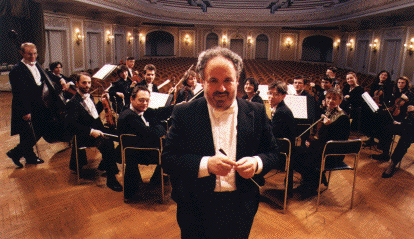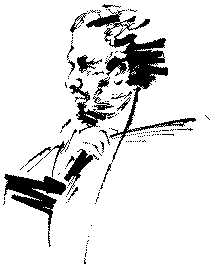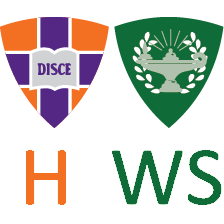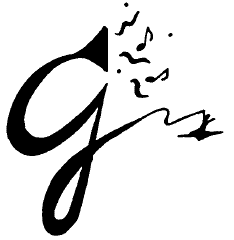Geneva Concerts Presents:
Friday, 14 January 2000, 8:15 PM
Chamber Orchestra Kremlin
Misha Rachlevsky, Music Director

The Program
GRIEG: Suite "From Holberg's Time", Op. 40
Praeludium (Allegro vivace)
Sarabande (Andante)
Gavotte (Allegretto)
Air (Andante religioso)
Rigaudon (Allegro con brio)
PROKOFIEV:
Visions Fugitives, Op. 22
Arranged for string orchestra by Rudolf Barshai
Intermission
TCHAIKOVSKY:
Serenade for Strings, Op. 48
Pezzo in forma di sonatina: Andante non troppo - Allegro moderato
Valse: Moderato. Tempo di Valse
Elegie: Larghetto elegiaco
Finale (Tema Russo): Andante - Allegro con spirito
Program Notes

Misha Rachlevsky
Music Director
Edvard Grieg
Born: 1843. Died: 1907.
Suite "From Holberg's Time", Op. 40
Composed: 1884.
This Suite from Holberg's Time is filled with wonderful sonorities,
brilliantly utilizing the wide range of
colors which string orchestra can offer. While listening to this music, try to imagine this piece played on
piano. Wonder why? Here is the answer--when Grieg composed this work in 1884, for events
commemorating the 200th anniversary of the birth of fellow Bergener, Ludwig Holberg (generally
acknowledged as the founder of Danish/Norwegian literature), this was a piano suite. A year later Grieg
himself transcribed it for string orchestra, and in this "reincarnation" it became one of the most frequently
performed and recorded compositions.
The musical language is a wonderful fusion of baroque stylization, represented by its popular form of
dance suite and clear harmonic progressions, with the unmistakably Nordic melodic material.
Sergei Prokofiev
Born: 1891. Died: 1953.
Visions Fugitives, Op. 22
Composed: 1915-1917,
Arranged for string orchestra by Rudolf Barshai
Years ago I read a cute account of one's visit to a concert hall which, in essence, went like this: "On the
program there was Bruckner's Symphony No. xx. Musicians gathered on stage and the light was dimmed,
but still strong enough to glance through the program booklet, which I did. Then, some time later, the
majestic melody began unfolding, filling the hall and capturing everybody's attention. It was the main theme
of the first movement, and it was gorgeous. By that time the poor violins had been playing tremolo non stop
for at least 15 minutes". Bruckner's symphonies were aptly called "Cathedrals of sound", and to hold the
structure, one indeed needed a foundation of proportional might. One of the major challenges to the
performers of this music is to hold this structure as a whole, without losing sight of its dimension. In
day-to-day language, the composition should not feel too long.
The challenge of writing and performing miniatures is directly the opposite in nature, as the limited time
should not feel insufficient to define the work's emotional characteristics. Prokofiev succeeded
magnificently, writing Visions Fugitives as a piano cycle of 20 miniatures. The average length of each is
about one minute, and some as short as 20 seconds. Barschai transcribed 15 of them for string orchestra.
They are great fun to perform and, hopefully, to hear.
Piotr Ilyich Tchaikovsky
Born: 1840. Died: 1953.
Serenade for Strings, Op. 48
Composed: 1880.
The music of Tchaikovsky creates an illusion that it arrived in this world absolutely effortlessly (like the music of Mozart,
Tchaikovsky's favorite composer). It is indeed so at times, but far not always, and the supremacy of the results of his
numerous revisions, from corrections to major rewrites, convincingly illustrate Tchaikovsky's saying that "the muse doesn't
come without being called". The Serenade for String Orchestra (the correct Russian title, although in the West it is
customarily called "Serenade for Strings"), written in a relatively short time in September - October 1880 (simultaneously
with the 1812 Overture), was definitely one of those happy instances: ".. it poured from the heart" wrote Tchaikovsky.
Another lucky moment was the immediate and unanimous success of this work.
The Serenade quickly rose to the top tier of the works Tchaikovsky was scheduling for the concerts he conducted himself, and
under his baton was heard in many major European music centers as well as in his 1891 visit to the States, where he
conducted it in Baltimore and Philadelphia. It seem that the composer himself was nearly embarrassed for the affection he
felt for this work: (from his letter to Nadezhda von Meck, his pen-friend and patroness): "The first movement is my homage
to Mozart, it is intended to be an imitation of his style, and I should be delighted if I thought I had in any way approached
my model. Do not laugh, dear lady, at my zeal for standing up for my latest creation. Perhaps my parental feelings are so
warm because it is the youngest child of my fancy".
While the whole composition is heard on a single breath, so to speak, the two inner movements are extraordinary. The
Waltz is exquisite, and the Elegy is one of the most moving, heartfelt statements in music. Again, from Tchaikovsky's
letter to Nadezhda von Meck: "It is often said that good actors never perform for a whole audience. They choose one person
in the theater who appears to be a compassionate soul and perform the entire piece with the aim of pleasing only him or
her". There are not too many scores that can rival this Elegy as a medium to address "a compassionate soul".
Two points about Serenade which I learned recently, while not being anything significant, are amusing, and I will share
them with you. In his letter to Jurgenson, his publisher, Tchaikovsky revealed that he first conceived this work as a
symphony, then thought that his sketches could be appropriate for a string quartet or an orchestral suite, and finally decided
("inspired", as he wrote) on Serenade for String Orchestra.
And again, from Tchaikovsky's letter to Nadezhda von Meck, written after the Serenade was completed, but did not yet have
its official premiere performance: "I wish you could hear my Serenade performed properly. It loses so much played at the
piano, and I think that the middle movements played by the violins would win your heart". On the piano? Yes, a very
common practice before the invention of the phonograph, and even some time after. In the summer of 1881 von Meck hired
a 18-year-old Paris Conservatory student to play four-hand piano pieces with her as well as to give piano lessons to her
children. He also did some transcriptions on her request, and the excerpts from Swan Lake became his first published scores.
The name of a young man? Claude Debussy.
Chamber Orchestra Kremlin
First violin
Vladislav Bezroukov, Concertmaster
Reguina Baroukova
Maxim Avramenko
Olga Pomolova
Svetlana Sisenkova
Inna Zilberman
Second violin
Eskender Bekmambetov, Principal
Janna Grigorian
Tatiana Vinogradova
Alexandre Barklianski
Viola
Ilia Sokolov, principal
Natalia Belskaia
Vladimir Morgovski
Petr Delnov
Cello
Maxim Kozlov, principal
Alla Pitirimova
Valeri Zilman
Double bass
Konstantin Ouvarov, principal



 This series is made possible, in part, by a grant from the Williams Family Foundation, by a continuing subscription from
This series is made possible, in part, by a grant from the Williams Family Foundation, by a continuing subscription from 
